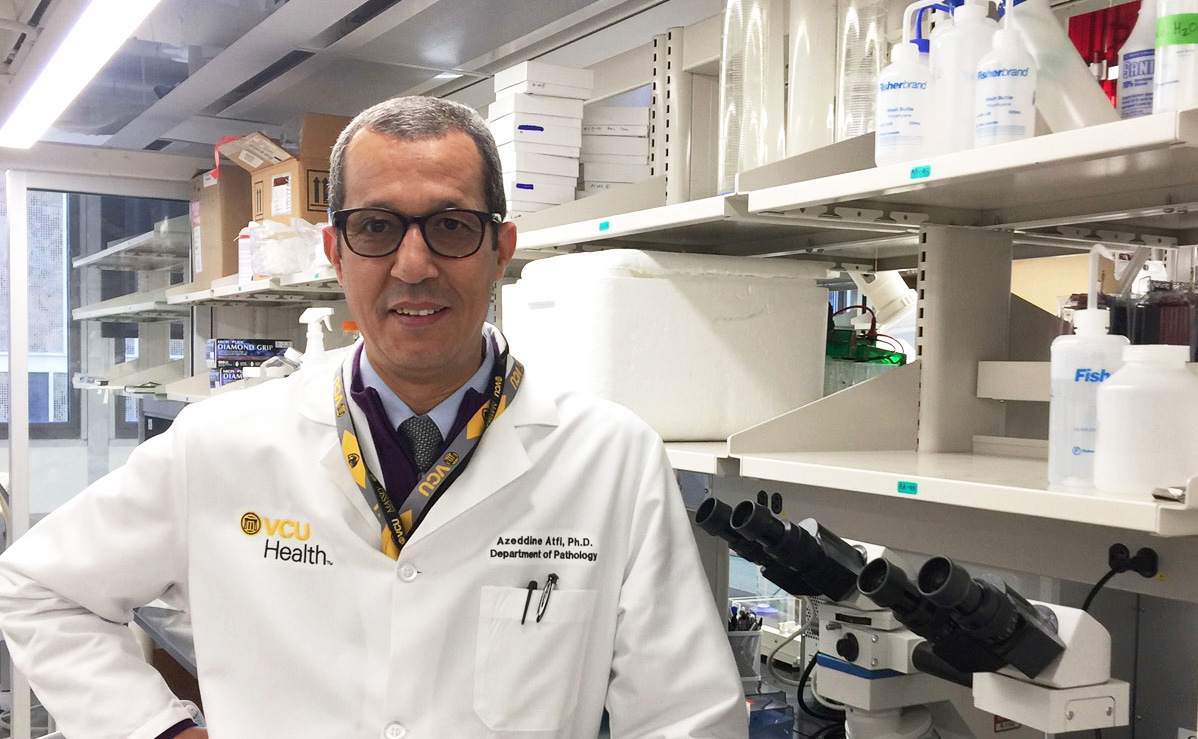Latest News
Research
Atfi studies proteins associated with pancreatic cancer, weight loss and diabetes as a means to develop novel immunotherapies
Feb 28, 2019

Azeddine Atfi, Ph.D., studies proteins involved in the progression of pancreatic cancer and comorbidities associated with the disease such as diabetes and weight loss as a means to develop novel immunotherapies.
Atfi joined VCU Massey Cancer Center as a member of the Cancer Cell Signaling and Cancer Molecular Genetics research programs in 2018. He is the chair of the Division of Cellular and Molecular Pathology and a professor of pathology at the VCU School of Medicine.
He has identified a specific protein called transforming growth factor beta (TGF-b) that initiates a cell signaling pathway and stimulates the growth of prostate cancer cells. By targeting the specific activity of TGF-b, Atfi hopes to develop immunotherapies that can slow, alter or prevent the formation of pancreatic cancer cells.
Pancreatic cancer is a rare, but deadly disease with a five-year-survival rate of less than 10 percent, according to the National Cancer Institute.
The pancreas is located in the abdomen near the liver and is responsible for controlling the blood sugar levels in the body as well as releasing enzymes that aid in proper digestion.
Pancreatic cancer cells create inflammation and block the function of or even destroy beta cells, the insulin-producing cells within the pancreas.
“It is estimated that more than 30 percent of pancreatic cancer patients will not die directly from the cancer, but because of comorbidities such as weight loss and diabetes,” Atfi said. “The majority of pancreatic cancer patients will develop diabetes, and all pancreatic cancer patients lose weight. They are very weak and cannot fight the disease.”
In collaboration with Steven Grossman, M.D., Ph.D., deputy director of Massey, Dianne Nunnally Hoppes Chair in Cancer Research and chair of the Division of Hematology, Oncology and Palliative Care, and Steven Grant, M.D., associate director of translational research, co-leader of the Developmental Therapeutics research program, and Shirley Carter and Sture Gordon Olsson Chair in Cancer Research at Massey, Atfi discovered another protein called Twist1 that leads to muscle wasting and weight loss in mice.
“By inhibiting Twist1 in mice with pancreatic cancer, we prevented weight loss and, as a result, increased survival,” Atfi said. “I want to initiate clinical trials using checkpoint inhibitors to hopefully develop an immunotherapeutic approach to block muscle wasting and increase survival in pancreatic cancer patients.”
Atfi is currently the principal investigator on two additional research projects totaling more than $2 million in funding. The first is an R01 grant from the National Institutes of Health (NIH) to investigate the role of the TGIF protein in the development and metastasis of osteosarcoma, a type of bone cancer for which there are no reliable therapies once the disease has spread. The second grant was awarded by the U.S. Department of Defense to study the role of TGIF in beta cell function and diabetes.
He previously received an R01 grant from the NIH to understand the role of TGIF in bone formation.
Atfi grew up in Casablanca, Morocco, where he lived close to the Atlantic Ocean. He completed his undergraduate studies and earned his Ph.D. in molecular and cellular biology at the University of Rennes in France. He finished a post-doctoral fellowship at McGill University in Montreal, Canada, in 1995.
It was during the completion of his Ph.D. that Atfi discovered that TGF-b stimulated the proliferation of prostate cancer cells, which shaped his career’s work.
While working in France in 2007, a consultant for the pharmaceutical company Aventis recruited Atfi to run a laboratory studying TGIF in bone formation at the Harvard School of Dental Medicine.
His research in Europe was not disease-specific, so when he came to the U.S. and tried to receive grant funding, he had to apply his research to a specific cancer. Atfi chose to study pancreatic cancer based on the deadly nature of the disease, how little research existed on it and the fact that a former technician in one of his labs passed away very suddenly after being diagnosed with it.
In 2011, he had acquired enough funding to start his own lab, and accepted an offer as a tenured professor and director of the Tumor Cell Biology Program at the University of Mississippi Medical Center Cancer Institute, where he worked most recently before joining VCU. He holds a lifetime position as a director for research and tenured professor at the Saint-Antoine Hospital in Paris.
Atfi has been published in more than 75 peer-reviewed journals including Cancer Cell, Nature Cell Biology and Developmental Cell, among others. He received an Excellence in Research Award from the University of Mississippi Medical Center for three consecutive years, and he received an Aventis Award in France in 2000.
Atfi lives in Short Pump with his wife and son, has an older son who lives in France and enjoys taking his boat out to Virginia Beach with his family.
Written by: Blake Belden
Related News
Research
Massey showcases research, collaboration and mentorship at American Association for Cancer Research annual meetingApr 30, 2025

Get access to new, innovative care
Treatments in clinical trials may be more effective or have fewer side effects than the treatments that are currently available. With more than 200 studies for multiple types of cancers and cancer prevention, Massey supports a wide array of clinical trials.

Find a provider
Massey supports hundreds of top cancer specialists serving the needs of our patients. Massey’s medical team provides a wealth of expertise in cancer diagnosis, treatment, prevention and symptom management.
